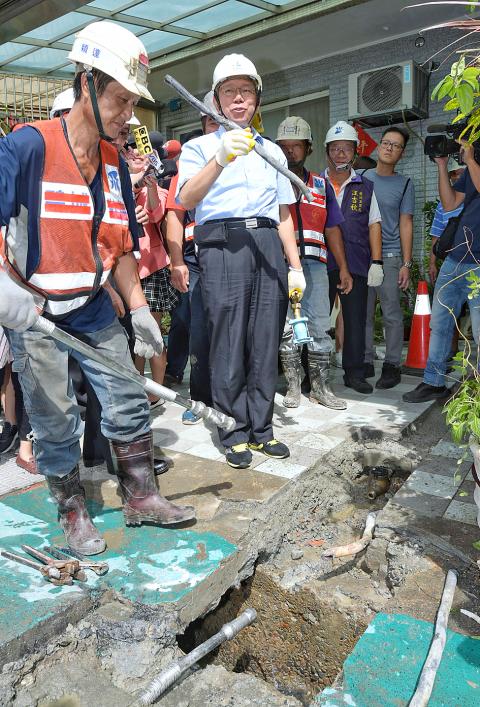The last section of Taipei’s lead water pipes was replaced yesterday, marking the completion of the replacement project about 15 months ahead of schedule, the Taipei Water Department said.
Following a tainted water scare in Hong Kong in 2015, when tap water was found to contain lead levels above WHO safety limits, a similar concern emerged in Taiwan after local media reported that lead pipes carried water to about 36,000 households in seven Taiwanese cities and counties.
The department at the time said that no lead pipes were installed after 1979 and that a total of 424km of lead pipes longer than 20m had been replaced between 2009 and 2013, adding that the remaining lead pipes in the city would be gradually replaced by 2025.

Photo: Chang Chia-ming, Taipei Times
However, Taipei Mayor Ko Wen-je (柯文哲) asked the department to reschedule the replacement project and allocate more funds to expedite it, promising to replace all lead pipes in the city with stainless steel pipes in three years.
Speaking at Dunqing Park (敦親公園) in Taipei’s Daan District (大安) yesterday, department Commissioner Chen Chin-hsiang (陳錦祥) said that with an additional budget of NT$420 million (US$13.86 million), the department was able to replace lead pipes serving 17,714 households in 21 months — 15 months sooner than scheduled.
At a media gathering in an alley next to the park, Ko held up the city’s last lead water pipe and gave a new stainless steel pipe to a worker to install it, marking the completion of the project.
“Taipei, being an old city, has a development history of more than a decade ... and the remaining ones [lead pipes] have been replaced in the past two years,” he said. “This marks the end of lead water pipes in Taipei.”
The new pipes are made using corrugated stainless steel tubing, which is also used in Japan, and has better resistance against earthquakes and mild excavator damage, Chen said, adding that the new pipes can ensure better water quality for the next 40 to 50 years.
Ko said the city government aims to install drinking fountains in all the parks in the city, hoping they will reduce the use of bottled water and disposable containers, which are a heavy burden on the environment.

Intelligence agents have recorded 510,000 instances of “controversial information” being spread online by the Chinese Communist Party (CCP) so far this year, the National Security Bureau (NSB) said in a report yesterday, as it warned of artificial intelligence (AI) being employed to generate destabilizing misinformation. The bureau submitted a written report to the Legislative Yuan in preparation for National Security Bureau Director-General Tsai Ming-yen’s (蔡明彥) appearance before the Foreign Affairs and National Defense Committee today. The CCP has been using cognitive warfare to divide Taiwanese society by commenting on controversial issues such as Taiwan Semiconductor Manufacturing Co’s (TSMC, 台積電) investments in the

HELPING HAND: The steering committee of the National Stabilization Fund is expected to hold a meeting to discuss how and when to utilize the fund to help buffer the sell-off The TAIEX plunged 2,065.87 points, or 9.7 percent, to close at 19,232.35 yesterday, the highest single-day percentage loss on record, as investors braced for US President Donald Trump’s tariffs after an extended holiday weekend. Amid the pessimistic atmosphere, 945 listed companies led by large-cap stocks — including Taiwan Semiconductor Manufacturing Co (TSMC, 台積電), Hon Hai Precision Industry Co (鴻海精密) and Largan Precision Co (大立光) — fell by the daily maximum of 10 percent at the close, Taiwan Stock Exchange data showed. The number of listed companies ending limit-down set a new record, the exchange said. The TAIEX plunged by daily maxiumu in just

INVESTIGATION: The case is the latest instance of a DPP figure being implicated in an espionage network accused of allegedly leaking information to Chinese intelligence Democratic Progressive Party (DPP) member Ho Jen-chieh (何仁傑) was detained and held incommunicado yesterday on suspicion of spying for China during his tenure as assistant to then-minister of foreign affairs Joseph Wu (吳釗燮). The Taipei District Prosecutors’ Office said Ho was implicated during its investigation into alleged spying activities by former Presidential Office consultant Wu Shang-yu (吳尚雨). Prosecutors said there is reason to believe Ho breached the National Security Act (國家安全法) by leaking classified Ministry of Foreign Affairs information to Chinese intelligence. Following interrogation, prosecutors petitioned the Taipei District Court to detain Ho, citing concerns over potential collusion or tampering of evidence. The

‘COMPREHENSIVE PLAN’: Lin Chia-lung said that the government was ready to talk about a variety of issues, including investment in and purchases from the US The National Stabilization Fund (NSF) yesterday announced that it would step in to staunch stock market losses for the ninth time in the nation’s history. An NSF board meeting, originally scheduled for Monday next week, was moved to yesterday after stocks plummeted in the wake of US President Donald Trump’s announcement of 32 percent tariffs on Taiwan on Wednesday last week. Board members voted to support the stock market with the NT$500 billion (US$15.15 billion) fund, with injections of funds to begin as soon as today. The NSF in 2000 injected NT$120 billion to stabilize stocks, the most ever. The lowest amount it